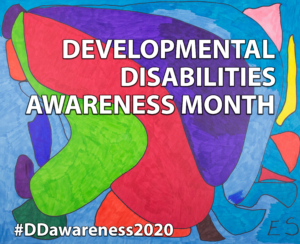
Kathy Brill, individual and family services industry expert
March is Developmental Disabilities Awareness Month. This month we sat down with two of our NAB members, Kathy Brill (KB) and Berthy de la Rosa Aponte (BA) to learn about some of the unique issues and experiences of parents of individuals with developmental disabilities (IDD) and how they have supported their children in navigating education, supports and services.
So many Americans fall under the umbrella of disability protections. Who are we discussing when we think about awareness of individuals with developmental disabilities?
BA: IDD may be difficult to define as it’s different in each state. Some states may only include with IDD while others may include different types of disabilities. In Florida it includes Intellectual Disabilities, Cerebral Palsy, Autism Spectrum Disorders, Spina Bífida, and Prader-Willi syndrome “that manifest before 18 years old.”
KB: When I hear IDD, I think of those who are born with an intellectual disability, or acquire one before a certain age, and are in need of supports and/or services. I believe definitions on age, limitations, etc. are unique to each state. However, I personally feel uncomfortable when we focus awareness on just one category of disability, though, because I personally feel it creates a feeling of separateness between those who are in need of services/supports. It’s yet another form of “labeling,” which I think is detrimental in too many ways to mention. It has a tendency to perpetuate stigma. There are a lot of people who acquire disabilities after the state designated age cut-off, such as those whose genetic conditions do not appear until years later, acquired diseases or conditions, veterans, those who have accidents, spinal cord injuries, etc. They do not fit within a state’s definition of IDD, even though they may now have the same, or similar characteristics. It then becomes very complicated, because there are

Berthy De La Rosa-Aponte is a disability advocate with 30 years experience and the parent of a child with intellectual disabilities
separations and differences in funding streams, supports, and services, depending upon the category of disability you fall under. It becomes a very complicated system when you are trying to help individuals find the needed supports and services. We need to create a seamless system, and one that is easily accessible when needed.
What are some of the unique issues being faced by people with IDD and their families?
KB: I really think that civil rights is still key. The disability community is one of those communities that has not yet received full civil rights protection. There is a lot of prejudice, a lot of bias, and a lot of assumptions that go around when one has a label of disability — that is why the focus on employment, community living, and housing is so important. We have to keep these topics in the forefront, because each time that someone is successfully doing something that was assumed could not be done by a person with a disability, it creates an a-ha moment. So we need to create a whole bunch of a-ha moments to change the culture of how some people negatively view people who have disabilities. We have to break down that false perception, and the best way to do that, is to have a world where we all belong and are treated equally. Then, we can hopefully end stigma.
BA: Today’s biggest challenge facing many individuals with disabilities is the lack of in home personal support aides that allow individuals with disabilities to live in their homes and with their families and have freedom & access to community participation. Also, a shortage of registered therapists to provide maintenance therapy. Under the Jimmo Settlement Agreement Medicare is now covering long-term therapy, but it must be provided by a registered therapist and not by an assistant therapist. In South Florida, only a few agencies are aware of the settlement agreement and they can’t find registered therapists to provide the services, so my daughter and many others are not having access to therapy services. Another issue that continues to affect people with disabilities is that many schools are still not preparing students with disabilities with the needed skills to be able to exit schools to meaningful and productive lives. Many students exit schools to a cliff that lacks opportunities for further education and employment opportunities that can give them the independence and full community participation for their adult lives. Many students transition to segregated “Day Programs” where many remain for the rest of their lives.
No doubt that thanks to the advocacy of many, we have come a long way with laws and regulations such as IDEA, ADA, etc. that facilitate the rights of individuals with disabilities, but after decades, are still not being fully implemented, especially for those that are not able to advocate for themselves or their relatives due to lack of knowledge or the energy that sometimes is required to be an advocate.
 KB: Education for students with IDD, as with all students, needs to be done in fully inclusive environments. School gets us ready for adulthood in the real world, so it’s important for our kids who have IDD to fully maximize their preparation for the real world. This needs to happen in the regular classroom, in the regular school district, within the child’s neighborhood school. IDEA laws support our kids to be taught in the least restrictive environment and to provide the needed services and supports to make that placement successful. However, often times, schools ignore this. I think that it sometimes depends on the resources of the school, but from my experience, I believe it has more to do with leadership and attitude of the administration.
KB: Education for students with IDD, as with all students, needs to be done in fully inclusive environments. School gets us ready for adulthood in the real world, so it’s important for our kids who have IDD to fully maximize their preparation for the real world. This needs to happen in the regular classroom, in the regular school district, within the child’s neighborhood school. IDEA laws support our kids to be taught in the least restrictive environment and to provide the needed services and supports to make that placement successful. However, often times, schools ignore this. I think that it sometimes depends on the resources of the school, but from my experience, I believe it has more to do with leadership and attitude of the administration.
When schools segregate students, they often claim it is because parents prefer it. I became perplexed by the thought that families would prefer to see their child segregated, so a long time ago I began asking parents this question. “If Johnny could get all the necessary services and supports in a regular classroom, in their neighborhood school, would you still choose to have them taught in a segregated classroom?” They always chose the regular classroom as their response. Right now, I think that our schools and environments are not doing that – they are still providing different services in different locations so families are assuming that services are better where they are more specialized, but those specialized features, if brought into the classroom – assistive technology, universal design, an inclusive curriculum – bring that in, and I bet you’d be surprised at how many individuals would choose full inclusion instead. IDEA needs to be implemented more rigorously, with greater oversight from Department of Education. It is way too lax in its duties.
Lack of full implementation of the ADA (Americans with Disabilities ) is another unique issue we still face. It is very difficult for individuals, their families, and friends, to plan visits for events, vacations, eating out in restaurants, etc. I can’t count the number of times our own family has encountered inaccessible sidewalks, curbs, steps into stores and businesses, narrow pathways, and the list goes on and on. In addition, it’s frustrating to not find parking spots because able-bodied individuals use those spots for their own convenience. The ADA definitely needs to be implemented more rigorously.
Americans are living longer and it is estimated that in 2025 that most of the Baby Boomers will be 65 or older. Will this significant aging boom have an effect on individuals with ID/DD?
KB: I actually think there will be a positive effect because we will end up having a lot of the same support needs. Additionally assistive technology is just running wild right now, which is also helping both populations, but again, because of having those same needs, I want to see us come back again to Universal design. I think that we need to take a bigger look at supporting Universal design in as many areas of society as possible. Think about the amazing benefits of Universal Design in housing! It would benefit our society as a whole.
BA: When my daughter was diagnosed, we were told that should would live to be 30. She is 38 now and she has a health issue that is complicated. I lost my husband almost 2 years ago, I’m 69 – and it is getting harder for me to support Lucy’s needs as we are both getting older. My late husband and I chose to not adjudicate our daughter legally incapacitated, so she is a competent legal adult. I am currently her guardian advocate under FS 393.12. Even though I am not legally responsible for her, my late husband and I always believed that we continue to have the moral responsibility to support her so that she can always have a most meaningful inclusive and dignified life. I wonder if when parents of individuals that assume full guardianship by deeming their children legally incapacitated, are not only limiting their rights, but may be required to assume all financial responsibility for them.
The Americans with Disabilities Act (ADA) turns 30 this year. Is it still important to recognize Individuals with IDD since we have long-standing  disability legislation?
disability legislation?
KB: Yes it is. As much as I like to advocate for all disability inclusion, I’ve been in this long enough to understand why IDD needs to have its own focus at times. People with IDD have lifelong needs, most of the time from birth, so you really do need to make sure those services and supports are protected. While I think it is currently important to keep the distinctions between all disabilities and IDD, there is also a strong need to have the systems work together to make it much more seamless, so that each of us, whether we have a son, or daughter, or family member with an acquired disability or IDD, they will not have to figure things out for themselves. Instead, the system will automatically surround us and support us on those needs. I’d love to see an invisible line there that nobody can tell the difference between services and supports and you don’t have to fight for one or the other and nobody needs to figure out which waiver you are on, or which funding stream you are being supported by. This would be a huge support for people with IDD and those who acquire disabilities later, including aging. When we get this to happen systemically and successfully, maybe then we can revisit this question regarding necessitating labels. In the meantime, I will continue to advocate!
BA: For decades, I too have been advocating for people with all disabilities, and will continue to do it, but I agree with Kathy that individuals with IDD need to continue having a “unique focus.” The federal implementation of legislation such as the ADA, IDEA, etc. is much easier to implement across disabilities than state funded waiver services. As states must balance their budgets, it will require state legislators to appropriately fund services to individuals with all levels of disabilities. In Florida, for years, the Agency for Persons with Disabilities (APD) that is currents serving more than 30,000+ people with Developmental Disabilities and has 20,000+ individuals on a waiting list, continues to run over budget. Last year, the agency was more than $100 million over its billion-dollar budget. Florida has another Waiver for people with other disabilities and the elderly that also has a waiting list. So yes, as the ADA turns 30 this year, it is still important to recognize the unique needs of Individuals with IDD.
Kathy Brill is the owner of Brill Consulting LLC. An expert in her field, Kathy is mom to three daughters.. Her youngest, Alexa, age 30, was born three months premature and uses numerous personal and assistive technology supports to assist her in being successfully and fully included in all aspects of her own home, employment, and community.
Berthy De La Rosa-Aponte has been a disability advocate for over 30 years. Her professional experiences has centered on administering services and programs to the disability and/or the Hispanic communities in the US in the educational and social service fields


